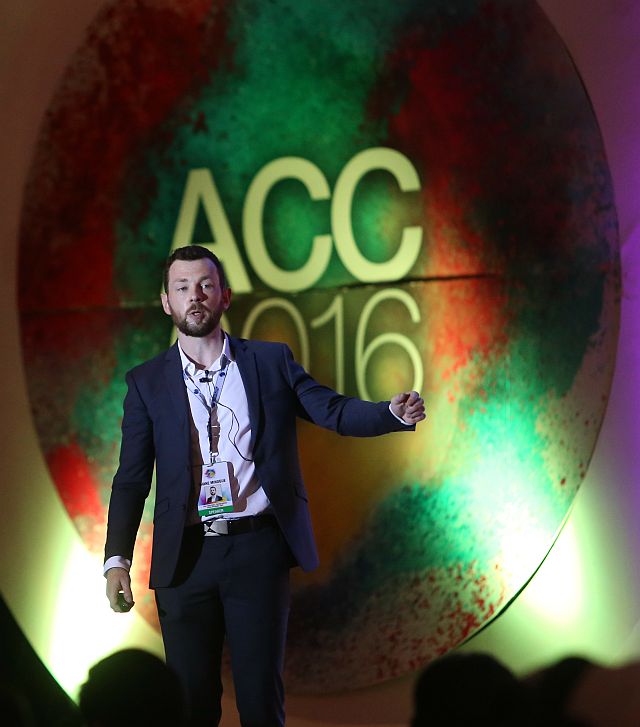Telcos urged to embrace digital transformation

Shane Minogue, lead analyst of IDC Australia and New Zealand, is keynote speaker of the 12th Asian Carriers Conference, which opened at Shangri-la Mactan Resort and Spa. (CDNPHOTO/LITO M. TECSON)
1,300 representatives of telecommunications firms attend Asian Carriers confab in Mactan
Telecommunications carriers from all over the globe were encouraged to embrace digital transformation or risk lagging behind their competitors.
Shane Minogue, telco lead for Australia and New Zealand at the International Data Corporation (IDC), said digital transformation is not just the “transformation of digital things” but is about strategy, perspective, and alignment of business in the digital era.
“When we hear transformation, we think that when we begin this journey, we can complete it and then I am completely transformed. But it’s actually a process we begin, but never really complete. You continue to evolve as your business evolves,” he said in a keynote speech during the 12th Asian Carriers Conference at Shangri-La Mactan Resort and Spa in Lapu-Lapu City, Cebu on Tuesday.
This year, the ACC gathered 1,300 delegates from over 60 countries worldwide to discuss the latest trends within the telco industry.
The conference runs from Sept. 6 to 9 and will conduct several workshops on market trends, adapting to disruption, and business innovations, among others.
With the onset of the Digital Age, Minogue said telco carriers had to compete with big digital data apps, lean startups, as well as, digital disruptors within their industries and that the only way to address these threats would be to disrupt one’s way of doing business as well.
Disruption defined
James McQuivey, vice president and principal analyst at Forrester Research, in a contributed article on Forbes, defines “digital disruption” as a way of rethinking the entire business and not just one’s technology portfolio.
McQuivey said digital disruption would involve the use and creation of digital tools, aggressive exploitation of digital platforms, a focus on customer experience, innovation, and partnerships.
Among the disruptors that are redefining entire industries today are WhatsApp (telco), Uber (transportation), Airbnb (accommodation), and Netflix (entertainment).
Digital disruptor
Minogue described the journey towards becoming a digital disruptor in a five-level process.
It begins with the “digital resister” stage which is characterized by total disconnection from the digital mindset. Then, they become “explorers” who see the potential in disruption, and then, they evolve to become “players” who collaborate with others in digital initiatives.
From there they become “transformers” who lead disruptions in their industries on an ongoing basis, and finally, they become the true “disruptors” who bring change not only in their industries but related industries as well.
IDC survey
In a survey conducted by IDC among 1,500 companies across the globe, it was found that Asia lagged behind Europe and the US in terms of digital transformation maturity.
The study showed that 45 percent of digital resisters and 33 percent of digital explorers were from Asia. Only 15 percent were players, 6 percent were transformers, and only 1 percent were disruptors.
In embracing digital transformation, Minogue cited three key challenges that telcos all over the world would be facing today — talent, legacy and mindset.
“We simply don’t have the type of employees today that would drive this kind of creative disruption, this innovative thinking, and even to deal with the new technologies we are introducing, particularly software-dependent,” he said.
He added that there would be a need for companies to shift to open-source acquisition, to rely on contractors, partnerships, and short-time fulfillments to achieve their goals.
Telcos, he said, should also change the way they think, saying that these companies should start “operating as a digital service operator.”
“We need to introduce new paradigms of thinking, incentivize creative disruption in business, allow organizations to question themselves, create feedback loops at every level so people can question the way things are currently done,” he said.
Telcos evolved
Ernesto Alberto, PLDT-Smart executive vice president, said that since the first ACC 12 years ago, telcos have evolved from mere carriers to carrying on more dynamic roles.
“Our old roles had us managing the long tail of the legacy business in voice. Twelve years after the first ACC, that role today seems distant and I dare say, archaic,” he said.
Today, telcos all over the world not only offer voice services, but also internet and even digital television services.
Telcos today
“Therefore, we are no longer telephone carriers in the traditional sense, and hopefully, should not remain to be just pipes,” said Alberto.
New technologies have disrupted the telco industry and, as a consequence, changed the market behaviors and buying habits.
Alberto said that conferences such as the ACC are the key to the industry’s sustainability and survival.
Disclaimer: The comments uploaded on this site do not necessarily represent or reflect the views of management and owner of Cebudailynews. We reserve the right to exclude comments that we deem to be inconsistent with our editorial standards.
